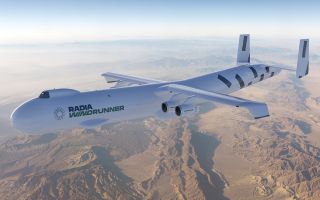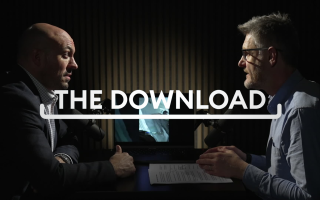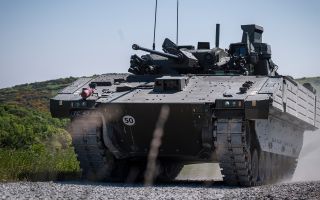Trump's Tweets: Defence Statements From The President's First 100 Days
The Trump administration has reached its 100-day milestone and Forces News has taken a look at some key defence-related tweets from the new US President.
Recently, the Press Association analysed the more than 400 tweets published by President Trump so far.
They have found that 108 of them, over a quarter, featured disputed or unestablished claims.
We've taken a look at some of the statements made by Mr Trump on defence...
On service personnel
Of course, one-quarter of tweets featuring disputed information leaves three-quarters that don't.
That's plenty of room for proclamations few would disagree with.
One example is Trump's glowing endorsement of Navy SEAL Ryan Owens, who died during a raid in Yemen shortly after the Republican became president:
Similarly, the President spoke favourably of Vietnam veterans:
He tweeted this in conjunction with signing the 'National Vietnam War Veterans Recognition Act' on the same day.
The law has designated March 29 as an annual recognition of Vietnam veterans separate from that of November 11, which honours veterans in general and coincides with the end of the First World War.
However, the President’s comments about a particular Vietnam veteran have caused controversy.
During the presidential campaign, candidate Trump said in an interview that Senator John McCain was only considered a war hero because he was captured, and that "I like people that weren’t captured, ok, I hate to tell you".
Since becoming president, Mr Trump has also tweeted that Attorney General Richard Blumenthal lied about having served in Vietnam:
The New York Times has reported that this is correct, with Blumenthal having obtained at least five military deferments. He used them to study and serve as a special assistant to a publisher at The Washington Post, that facilitated him getting a job in the Nixon administration.
He did eventually become a Marine Reserve, but did so at a point in the war that virtually guaranteed he'd never be sent into combat in Southeast Asia.
Someone else who took five deferments to avoid serving in Vietnam, however, was Donald Trump.
More - Comment: Is Today’s Middle East So Different To Vietnam?
The New York Times has reported that Mr Trump, despite having been a college athlete, claimed he had heel spurs after graduation and received his first deferment on medical grounds. The other four were to obtain further education.
The tweets about Blumenthal were published in the context of confirmation hearings about the President's nomination for the Supreme Court, Neil Gorsuch.
In an interview with NPR, Blumenthal said he had reservations about approving Gorsuch because he did not believe he would stand up to overreach by the president.
He said that the independence of the judicial branch of government was more important now than ever, because of the ongoing FBI investigation into alleged collusion between Trump administration officials and Russia during the 2016 election.
…speaking of Russia…
It's no secret that the issue of alleged Russian interference and collusion with Trump officials in last years' presidential race has dogged President Trump since he took office, and that it has direct implications for UK defence policy.
President Trump, however, has made it known that he disagrees:
One voice of support for this sentiment came from the pro-Trump bloggers Diamond and Silk:
In response, military intelligence analyst-cum-political commentator Malcolm Nance tweeted:
Nance's book 'The Plot to Hack America' says compromising material was hacked from the Democrats, thoroughly vetted and then strategically released to cause maximum damage to Hillary Clinton's candidacy.
This, Nance says, was almost certainly done professionally by Russian intelligence because the volume of material stolen and the turnaround time in publishing the most politically-damaging sections necessitated a large-scale and highly professional operation.
But President Trump made it clear he disagreed with this assessment:
And on the NATO question?
Some fear that a Trump administration that is too close to Russia could lead to a weakened NATO.
At the end of last year, Mr Trump began calling attention to a perceived lack of adequate defence spending by alliance members.
He was, and is, correct in that only four or five members meet the requirement of spending 2% of GDP on defence. Germany is not one of them.
Germany spends roughly 1.2% and the US 3.3%.
Crucially though, Germany doesn't owe the US money.
NATO is not run by other countries paying the US for their own defence. Rather it is an organisation in which members pool their resources to create a common defence network in Europe.
As the 'Factcheck' website puts it:
"The United States does provide an outsized military commitment to NATO, but this is not done as a [favour] for Europe; it's done to benefit all countries in the alliance... And the United States has several high-profile military bases in Germany that are vital, serving as a key launching point for attacks against terrorists in the Middle East."
And that is a key point - as the world's only superpower, the US has multiple defence commitments outside of its involvement in NATO and this helps explain its exceptionally large military expenditure.
About that other defence spending
Mr Trump had also stated during his campaign that $6 trillion that could have been spent more productively at home was instead poured into military campaigns around the Middle East as a whole. Are these figures correct?
'Politifact', a fact-checking website that rates the accuracy of claims made by elected officials and others, looked at estimates from Brown and Harvard Universities.
Brown placed the figure spent on operations in Iraq, Afghanistan, Pakistan and Syria between 2001 and 2016 at $1.6 trillion. However, the same study also said that the figure was $3.6 trillion if counterterrorism spending were factored in.
Harvard's study put the cost of the wars in Iraq and Afghanistan at between $4 trillion and $6 trillion because it factored in nation-building costs, personnel spending and future expenditure on medical care and disability benefits for veterans.
The issue of whether or not Mr Trump supported the war in Iraq when it was first launched has also been disputed.
The President has claimed that he was vehemently opposed to the conflict before it started and that he was visited by "people from the White House" who attempted to silence him.
Factcheck examined this issue and found no evidence to support his claim.
There was a September 11, 2002 interview with Howard Stern in which Mr Trump expresses some measure of support for the war. When asked by Stern if he thought invading Iraq was a good idea, Mr Trump replied:
"Yeah, I guess so. You know, I wish [Iraq] was, I wish the first time it was done correctly."
Factcheck found no other evidence of support for the war by Trump. A few months before the invasion, he was on the fence, saying on a Fox interview:
"Either you attack or you don't attack."
In fact, Mr Trump had financial reasons to not want war, or at least the uncertainty it was causing.
Trump Hotels and Casino Resorts were planning "to sell $485 million in junk-grade bonds", and unpredictability in the markets because of the potential war was complicating the sale.
Two days after the war had started, Trump said on another Fox interview that the war "looks like a tremendous success from a military standpoint" and he forecast the market "[going] up like a rocket" as a result of the war.
The next day he was quoted as saying that war, in general, is depressing and that his Miss USA pageant was a positive counterweight.
Three days after that he called the war "a mess", and three months after that, on July 1, 2003, Mr Trump was expressing clear concerns about the costs of the war.
From that point on he seems to have very definitely opposed it, acknowledging later that the capture of Saddam Hussein was a "great thing" but that "a lot of people [are] questioning" if it had even been worth going to war in the first place.
And now?
During his campaign, Candidate Trump was very vocal about his intention to 'bomb the s**t out of ISIS' - which was prominently followed through with the use of the 'mother of all bombs' on an underground network of IS tunnels in Afghanistan.
As President, he has certainly expressed outrage at the groups' actions.
That ISIS have slaughtered multitudes is in no dispute, but NPR reported on their killing of Christians in particular and put it in context.
The President has said that his immigration policy has been informed by his conviction that Christians have been uniquely victimised by ISIS and what has been going on in Syria. Speaking on the 'Christian Broadcasting Network' he said:
"They've been horribly treated. Do you know if you were a Christian in Syria it was impossible, at least very tough to get into the United States? If you were a Muslim you could come in, but if you were a Christian, it was almost impossible and the reason that was so unfair, everybody was persecuted in all fairness, but they were chopping off the heads of everybody but more so the Christians. And I thought it was very, very unfair. So we are going to help them."
NPR reports that 99% of refugees admitted to the US from Syria in 2016 were Muslim and less than 1% Christian. This corresponds to a population base of 93% Muslim, but that figure dates from 2010 - obviously, populations have been flung about by events considerably since then so it is difficult to pin down exact figures for religious groups living there now.
NPR also points out that Christians have received some degree of protection from the Assad regime, and that this might account for the over-representation of Muslims as refugees to the US from Syria.
The bigger picture (i.e. not just refugees from Syria) also shows that the number of Christian refugees admitted to the US in 2016 was on parity with the number of Muslim refugees: 37,521 to 38,901, respectively.
Obviously, as the majority of the population in the Middle East, Muslims have also been the majority of ISIS' victims (the group are Sunni extremists).
On other 'evil-doers'
North Korea has been prominent in the news lately, and President Trump has had plenty to say about the country. Here is one example:
President Trump has said that there is a chance the US could end up having a "major, major conflict" with North Korea, but Secretary of State Rex Tillerson has clarified that:
"We do not seek a regime change in North Korea. We are not seeking the collapse of the regime."
Instead, Tillerson said that the US would conduct talks with the North Korean regime and that its goal was the removal of the north's nuclear arsenal.
Dealing with dissenters at home
Shortly after coming into office, President Trump opined on Chelsea Manning's prison sentence being commuted by Obama and subsequent comments made by the whistleblower:
President Trump appears to be in the position of defending Obama against Manning.
Manning, however, was saying that Obama had effectively been 'too nice' to his opponents and that America needs a strong and unapologetically progressive leader.
Her point was that Obama had started out by trying to compromise with Congressional Republicans and had faced relentless opposition. In future, she proposed that Democratic presidents be more stridently left-wing.
Perhaps this is what Trump was criticising. It seems difficult, after all, to believe that calling Barack Obama 'weak' is something he'd find objectionable. That's because someone else who has frequently levelled that charge at the former President is a certain Donald Trump!
With thanks to Michael Vadon for cover image.









